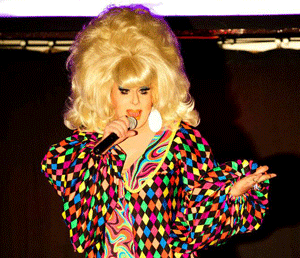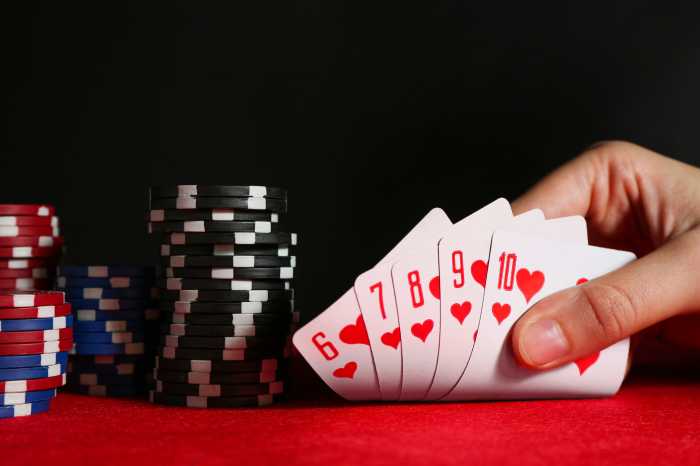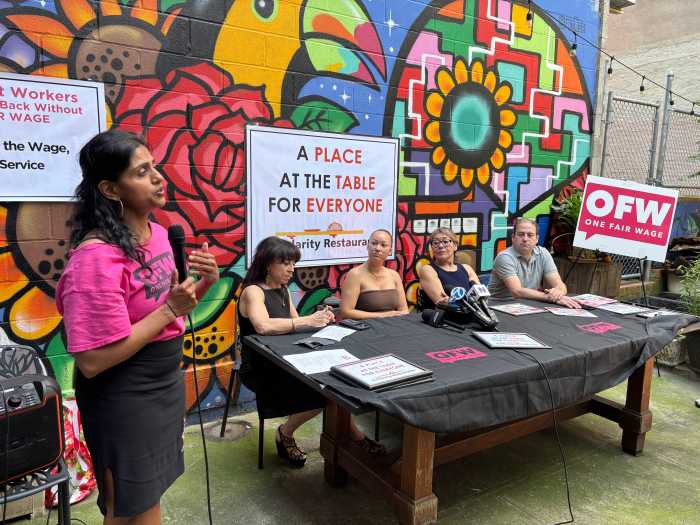BY SCOTT STIFFLER | Long in the legs, and even longer in the tooth, Lady Bunny is mad as hell — and you’re going to take it, when the self-proclaimed “old pig in a wig” lip-synchs, struts, swears, mugs, and muses her way through an evening of “very, very independent theater” during which you’re constantly aware of how an iconic, once-grand lady has been inexorably altered by changing times and tastes. Now, wait just a minute. Why would you think we’re talking about Bunny when we say “lady?” That’s transphobic…or is it?
Lady Bunny weighs in on haters, assimilators, and lost club culture
“There’s a loss of flavor in the area. It’s unbelievably sad to see New York City now, with XL as our only large gay nightclub,” says Lady Bunny, whose “Clowns Syndrome” is a relentlessly funny and joyously filthy one-drink-minimum show that lobs equally aggressive salvos at the gay community and the larger culture at hand. It’s sexually charged gay adult entertainment performed within cruising distance of Times Square — a defiant stand against respectability that’s as out of synch with the surrounding neighborhood as a nuclear family would have been three decades ago. That’s around the time when Jon Marc Ingle began to work the high heels and the even more vertically formidable hair that gave rise to Lady Bunny — and, soon after that, gave birth to the annual outdoor drag festival that brought crimes against good taste and gender conformity to the Village for over 20 years. Wigstock is consigned to history now, taking its place alongside recently closed Chelsea bars like Rawhide and Splash.
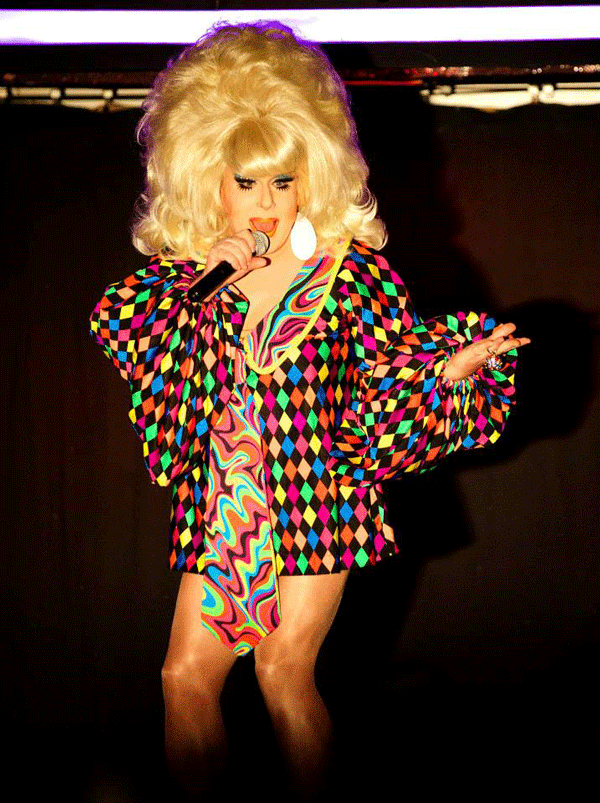
“That’s how I made my living,” recalls the 51-year-old veteran performer and promoter. “I DJ’d at the closing party of Splash,” notes Bunny, who, although “never a circuit queen,” did spin wax at various stops along the once-robust Manhattan gay bar and club grid that kept many a queen in stockings and various stuffings. “Now,” she says, “there is no way that you could pretend New York City is a nightclub destination. It’s very embarrassing when my friends come to town and ask me, ‘What is there to do?’ ”
More on that soon. When we recently spoke with Lady Bunny, her thoughts at the outset of our conversation were as far from the Big Apple as her physical self — which, last week, had just deplaned in Kalamazoo. “I’m performing at their Gay Pride tomorrow,” noted Bunny, who admitted to having never set foot in that part of Michigan before. “I wasn’t sure Kalamazoo was a real place. It sounds fictional, like a fairy tale. But here I am.” Far from the hardened Gotham venue that hosts “Clowns Syndrome,” would the good people of Kalamazoo be getting the same level of obscenity that endeared our trampy lady to a recent La Escuelita Cabaret Theater preview audience?
THEATER LADY BUNNY IN “CLOWNS SYNDROME”
Open Run: Tuesdays, 8 p.m.
At La Escuelita Cabaret Theater
301 W. 39th St. (btw. Eighth & Ninth Aves.)
Tickets: $19.95 (plus one-drink minimum)
Purchase at the door
or at brownpapertickets.com/event/629583
Online ticket sales end two hours
before showtime
Cash only at the door & for drinks
Visit enyclub.org & ladybunny.net
“I tone it down a bit whenever I leave New York,” admits Bunny. “Some of these Gay Pride festivals are in the daytime, and sometimes, gays have families or invite the straight community. I like offensive and vulgar comedy, but I don’t like to offend. So I do it where it’s appropriate. One year, I performed at a Virginia Gay Pride and it was a little bit too much. There was a dildo incorporated into the act, and some church group took a picture of it dangling near a little girl. So no more of that. I don’t want to be known as a Typhoid Mary who closes down Pride because they can never get their permits again.”
Free to let loose when performing “Clowns Syndrome” at La Escuelita, Bunny actually seemed disappointed that nobody’s hand went up when she requested a straight person head count. “What is this,” she asked with mock indignation, “Callen-Lorde?” Like a good many other jokes that night, it was followed by a well-timed rimshot. Ripped from the Vaudeville playbook, that time-honored punchline drumroll device, applied to Bunny’s act, was equally capable of giving a camp bump to the proceedings or leavening the bitter aftertaste of material calculated to provoke. Another calculated move on Bunny’s part: the show was co-written by Beryl Mendelbaum.
“She has a comic persona on Facebook as a kind of bitter, seething, mean-spirited Jewish retiree from Boca,” says Bunny, “and we’ve become friendly [through Facebook]. Beryl is able to write for me in my voice.” That’s of particular value when Bunny abandons the lip-synching, broad physical comedy, onstage costume changes, and Shirley Bassey tributes to make forays into more sober territory. “I want to get some serious information out there,” says Bunny, “and Beryl has helped me soften those issues with a joke, so it’s not just a show of tirades. “When I’m saying that militant trans activists are going too far by saying that Jared Leto should not have played his trans role in ‘Dallas Buyers Club,’ that they should have used a real trans women, I say that Bruce Jenner was not available.”
Is that funny, transphobic, neither, or a little bit of both? In “Clowns Syndrome,” it’s a question that Bunny constantly asks herself and the audience, often with a honey-sweet yet insincere pledge to strip all future versions of the show (DVD, viral videos) from any mention of offending words, deeds, and references. But what’s in a word, and who has the right to use it? In our Manhattan-to-Kalamazoo phone conversation, we challenged Bunny to a bit of word association — which ended up being more of an inkblot test. Here’s what Bunny said, when asked about the meat and potatoes soapbox topics she covers in “Clowns Syndrome.”
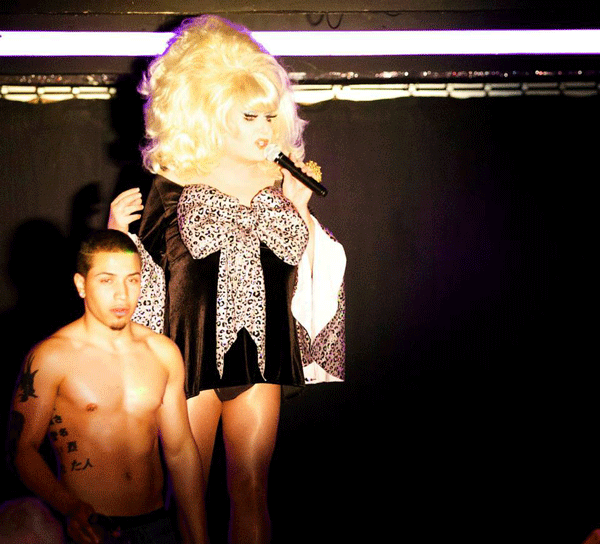
THE “T” WORD
LADY BUNNY:I know the word tranny from the London club scene, where it is used affectionately as an abbreviation for transvestite or transsexual. It’s never been a slur in my book and since it’s an abbreviation for transvestite, I’m free to use it. I wouldn’t use it to refer to a trans woman who doesn’t like it. I’m a drag queen. But I’m not going to be censored if I want to refer to myself as a tranny. A transvestite is someone who wears the clothing of the opposite sex, whether that’s Marlene Dietrich in a men’s suit or [The Rocky Horror Picture Show’s] Frank N. Furter, or a man who wears women’s lingerie and masturbates at home. Drag queen typically means a type of transvestite who performs, who is normally, when they’re not in drag, a gay male. What’s really hurtful is that drag queens have always been the most accepting of the transgender community. So this infighting doesn’t make sense. They have every right to say “I don’t like it,” but they don’t have the right to tell me to stop using it. If you don’t like the word, you can take its power away, because you are what you answer to.
I have a friend who is a post-operative transsexual and she actually coached Jared Leto on how to play a transsexual and these militants were slamming her and calling her a drag queen even though she is a post-op. If you are that, a drag queen is just about the meanest thing you can call someone. These activists are crying about being called ‘tranny,’ yet they are using hate speech themselves against members of their own community. Or against RuPaul. One of the most vocal of them tweeted, “I f***ing hate RuPaul.” I think that’s hate speech, when you say you hate someone.
What’s really bizarre to me is that while they’re putting Laverne Cox on the cover of Time magazine and mainstream America is beginning to understand and accept what a transsexual is, the gay community is infighting — and that’s preventing us from moving forward on the goals that affect all of us. The real challenge that trans people face is not words on a silly reality show [“RuPaul’s Drag Race”]. The challenges they face are the same as drag queens and gay people. They’re discriminated against for jobs and housing and they’re targets for violence.
ASSIMILATION
The gay movement is very conservative now. Fighting in the military is an establishment goal. Getting married? While I support equal rights, let’s be real. Marriage is often about property transferral. The gay marriage movement seems to be run by gays with money, and who are they? A friend of mine who’s black said he went to the celebration outside of Stonewall when New York got gay marriage, and he said he was the only person of color there. It just all seems very conservative to me, different than it was when we created Act Up and Queer Nation. These were radicals. They were taking on the Catholic Church and Big Pharma. Now, these gay men seem like, “Let’s kiss the government’s ass and achieve all these very conservative goals that uphold the establishment.”
NIGHTLIFE
There’s a couple of things going on. Clubs are hit by the recession and they don’t take any chances with smoking cigarettes or people selling drugs. Let’s face it, that’s a reason people go to clubs. Now, to stay in business, they have this bottle service, which is geared to people who are dumb enough to pay $500 for a bottle of vodka that costs $50 in the liquor store. If you’re doing that, then you must be a banker trying to impress your model-slash-hooker girlfriend. I don’t know any fun people who have that kind of money to burn. If you do, chances are you’re not a good dancer, you’re not in a colorful outfit, and you’re not any of those other things that made New York great.
I remember when you didn’t have to pay to be a VIP. You either were or you weren’t. That [attitude] is an insult to what nightlife used to be. Rawhide was where you went to hook up with a minimum of conversation, but clubbing wasn’t just about finding sex. It was about learning new dances, and seeing fashion. And remember the lost art of conversation? Can we get an app for that?
Grindr and online hookups also helped to kill the gay clubs. Gays don’t need to pay a cover charge to find a sexual partner. So today, I guess our safe spaces are online. But in the ‘70s and ‘80s, the clubs were the only place where you would see a large group of gay men converge. That’s where we fell in love. That’s where we ran to the dance floor with our hands in the air for every Diana Ross or Madonna song. That’s where we lived.
Club culture was gay culture. Now, gays are assimilating into straight culture, and what do we have? A lot of younger gays feel comfortable in straight bars, and that’s great for them — but for me, I say I want all the equal rights that straights have, but I don’t want their culture, because I’ve always felt gay culture is better. We have better taste. It’s being lost on the younger gays who like the same Top 40 as everybody else. Straight DJs used to come to the gay clubs to find all the good music.
GAYBORHOOD
One positive thing that’s happened over the past few years, is how a lot of gay bars have opened up in Hell’s Kitchen, which they’re calling “Hellsea.” Chelsea was all about the circuit queens. Now, Hell’s Kitchen is for the twinks. When I moved to New York, it was the older gays and the clones in the West Village and the more alternative gays in the East Village. How is it the gays always move to whatever neighborhood is trending? I guess they’re just fickle.
I’ve been around for a while and I’ve seen different scenes come and go. I’ll say this about New York, it is safer. That’s one plus. But it’s almost a little too safe.



